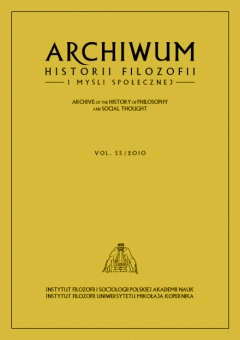Znaczenie Fenomenologicznych interpretacji Arystotelesa dla genezy fundamentalnej ontologii Martina Heideggera
The meaning of Phenomenological interpretations of Aristotle in genesis of Heideggers fundamental ontology
Author(s): Piotr PasterczykSubject(s): Ethics / Practical Philosophy, Phenomenology, Ontology
Published by: Instytut Filozofii i Socjologii Polskiej Akademii Nauk
Keywords: Heidegger; Time and the Being; fundamental ontology; hermeneutical phenomenology; practical philosophy; Nicomachean Ethics;
Summary/Abstract: The article discusses the early paper of Heidegger (Natorp Bericht, 1922) on basis of its new polish translation (M. Heidegger, Nota dla Natorpa, trans. Piotr Pasterczyk, Wyd. Rolewski). Thanks to Natorp Bericht Heidegger could obtain the chair of philosophy at the University of Marburg in 1924. The very philosophical meaning of this paper refers to genesis of fundamental ontology (Sein und Zeit) in Heideggers dialogue with VI. book of Aristoteles’s Nicomachean Ethics. h e connection between “Anzeige der hermeneutischen Situation” (Natorp Bericht) and “Daseinsanalytik” (Sein und Zeit) manifest: 1) specific terminology made by Heidegger for fundamental ontology which elementary form we find in Natorp Bericht; 2) Heideggers attitude towards philosophical tradition expressed in this terminology in Natorp Bericht and Sein und Zeit; 3) the hermeneutic-phenomenological understanding of the knowledge as interpretation.
Journal: Archiwum Historii Filozofii i Myśli Społecznej
- Issue Year: 55/2010
- Issue No: 55
- Page Range: 227-235
- Page Count: 9
- Language: Polish

